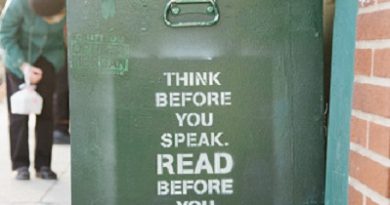ON WRITING: IS (BORING) ‘SAID’ THE BEST OPTION EVERY TIME IN YOUR SPEECH TAG?
I am not with the writers who argue for said as the best choice, no matter what. I believe there are instances where the inconspicuous, boring said does not do justice to writing. And too much of it where it could be replaced with something stronger is a weakness in writing–like putting too much water in your soup. Those instances may not be glaring to the reader, but from a critical standpoint, the writing, at the end of reading the entire book, will feel… unremarkable (it will feel like you should have done more where you did not). Let me explain what I mean.
True, said is not dead, and should be the choice most times because it is inconspicuous to most minds. However, I think the use of said and only said even in instances where the writing could be enhanced with a stronger more apt word is bad practice, and shows a writer playing it safe (too scared to express himself as vividly as possible), or a writing technocrat who has bought into a fallacious school of thought.
True, said should be used instead of words like beseech, implore, utter, voice and, yes, ejaculate too (but only because ejaculate attracts too much attention to it, and a word like ‘blurt’ can do the same work and go unnoticed, or be less noticed.
To get to the heart of what I am saying, you will have to understand two terms: strong verbs and weak verbs. I don’t know if these are terms in the English Language, but I know they are literary terms used by writers, especially fiction writers.
A strong verb, by definition, is one that adds context/details to how an action is performed. Examples are whispered, blurted, sang, snapped, growled, yelled, screamed, shouted, stuttered or stammered.
Notice how you get an idea of the way words are ‘said’ with these verbs.
For instance,
“Stop it,” John stuttered.
Does more than,
“Stop it,” John said.
Of course, you could say,
“S-stop it,” John said.
In this instance, you don’t need to say ‘stuttered’ because you have shown stuttering.
You could also say,
“Go away and never come back,” Thelma yelled.
Or
“Go away and never come back!” Thelma said.
Here the exclamation mark does the work (although I prefer the former because, for me, the mark says shout or raise one’s voice. A scream could be sudden, sometimes piercing).
But what about,
The electrocardiogram beeped a tune as Grandma lay asleep on her hospital bed, a tube inserted in her right arm. Horace held her hand and squeezed gently. “Please come back to us,” he whispered. “We love you.”
Look at it when whispered is replaced with said.
The electrocardiogram beeped a tune as Grandma lay asleep on her hospital bed, a tube inserted in her right arm. Horace held her hand and squeezed gently. “Please come back to us,” he said. “We love you.”
Don’t you agree that some impact or some emotion is lost? I think so. And there is no punctuation mark to show a whisper.
Let’s look at another example,
Molly had just taken the turkey out of the oven when the doorbell buzzed. The guests. They’re here. She took off her apron and rushed upstairs to tidy herself—at least check herself in the mirror. By the time she came down, the buzzing was relentless. She held her smile ready, swung the door open and sang, “Hellooo.”
Take this same sentence and replace ‘sang’ with ‘said’. The impact is lost, isn’t it? Definitely.
Do want to write like this, using said where you could convey stronger images and emotions by using strong verbs? Believe me, the critics will notice your flatness at the end of your book.
What if you were trying to show the way a child with asthma spoke. Would said do it justice? I see you shaking your heads. Right. It doesn’t. You could use it of course and there will be no problem, but another writer, using a more apt word, shows he is more versed than you are (in my humble opinion).
Jonathan took a few drags on his inhaler and said, “It’s alright. I’m okay now.”
Good. But a bit flat—the word said is too weak and (according to my school of thought) ought to be replaced with a more showing verb, a stronger verb. Let me try.
Jonathan took a few drags on his inhaler and wheezed, “It’s alright. I’m okay now.”
Better.
So you can see from these examples that strong verbs are showing verbs. That would mean that weak verbs are… telling verbs. Right. (Here I go with my Showing vs Telling again). My point is, replacing said with a rather inconspicuous showing verb like blurt (not ejaculate), and others I’ve mentioned, should not be frowned upon because the words are apt and do not distract. Many, like me, believe it is good practice and it enriches your work. I’m not alone, trust me. To appreciate this more, let’s look at weak verbs.
You know how math fractions can be simplified (reduced) to their lowest terms, well, that is how it is for weak verbs. Said is the lowest form or term for all weak verbs and it should be used in place of all weak verbs in a scene. I mention scene here because you’re supposed to show in a scene. Weak verbs might be tolerated elsewhere but in a scene, it weakens your writing. Have some strong verbs in your scene and readers won’t notice the weak ones, but if they’re all weak… Therefore said, according to my school of thought, should replace ALL weak verbs that imply speaking but not all the strong ones. That brings to the question.
 Charles Opara is a speculative fiction novelist currently finishing his first novel. He writes short stories of a much wider range of genres, some humorous. He is a programmer based in Port Harcourt, Nigeria, and a member of the Association of Nigerian Authors, Port Harcourt Chapter. He remains captivated by the logic in writing stories and programs. In 2014, his horror short story, It Happened, was shortlisted for the Awele Creative Trust Prize in his home country, Nigeria.
Charles Opara is a speculative fiction novelist currently finishing his first novel. He writes short stories of a much wider range of genres, some humorous. He is a programmer based in Port Harcourt, Nigeria, and a member of the Association of Nigerian Authors, Port Harcourt Chapter. He remains captivated by the logic in writing stories and programs. In 2014, his horror short story, It Happened, was shortlisted for the Awele Creative Trust Prize in his home country, Nigeria.





